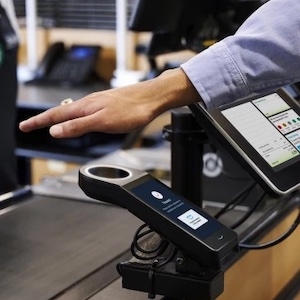
Amazon is rolling out its palm-based checkout system—which lets customers pay for products by waving their hand over a device—to the entire Whole Foods chain by the end of the year. As a result, customers won’t need their wallet or even their phone to shop at Whole Foods’ 500-plus locations.
The palm recognition service, called Amazon One, uses technology that creates a “palm signature” by capturing “surface-area details like lines and ridges, as well as subcutaneous features such as vein patterns,” the company said on its website. The palm signature is linked to a consumer’s Whole Foods account and accompanying credit card.
Amazon claimed the service is “100 times more accurate” than scanning irises of people’s eyes. “Your palm’s unique characteristics, such as creases, friction ridges, and underlying vein network, are a result of independent biological processes,” it said. “Even identical twins with the same DNA do not have the same palm surface and vein patterns.… After millions of interactions among hundreds of thousands of enrolled identities, we have not had a single false positive.”
The company even developed “liveness detection,” by which the technology can distinguish between actual palms and 3D-printed replicas.
The Amazon One service is currently available at 200 Whole Foods stores, as well as a handful of other retailers, such as Panera Bread, which has installed the technology in two locations. It’s been used about 3 million times to date.
All of this has, of course, raised privacy concerns. In 2021, Senators Bill Cassidy (R-La.), Amy Klobuchar (D-Minn.), and Jon Ossoff (D-Ga.) wrote to Amazon CEO Andy Jassy asking whether the e-tail giant planned to use the collected information for “advertising and tracking purposes.” They also questioned Amazon’s plan to store palm data in the cloud, as “data security is particularly important when it comes to immutable customer data, like palm prints.”
Amazon countered that the palm-print info is “not used by Amazon for marketing purposes” and that it will not share this data with third parties—including government demands, unless required to comply with a legal order.
“When you use Amazon One at third-party locations, Amazon doesn’t track what you do or buy after entering the location,” according to FAQs on the Amazon website. “That data is not associated with your biometric identity, and we built Amazon One that way intentionally.”
The company has also asserted that its data is secured by Amazon Web Services Cloud, and that only select employees with “specialized expertise” have access to that data.
Amazon bought Whole Foods in 2017.
(Photo courtesy of Amazon)
- Subscribe to the JCK News Daily
- Subscribe to the JCK Special Report
- Follow JCK on Instagram: @jckmagazine
- Follow JCK on X: @jckmagazine
- Follow JCK on Facebook: @jckmagazine





